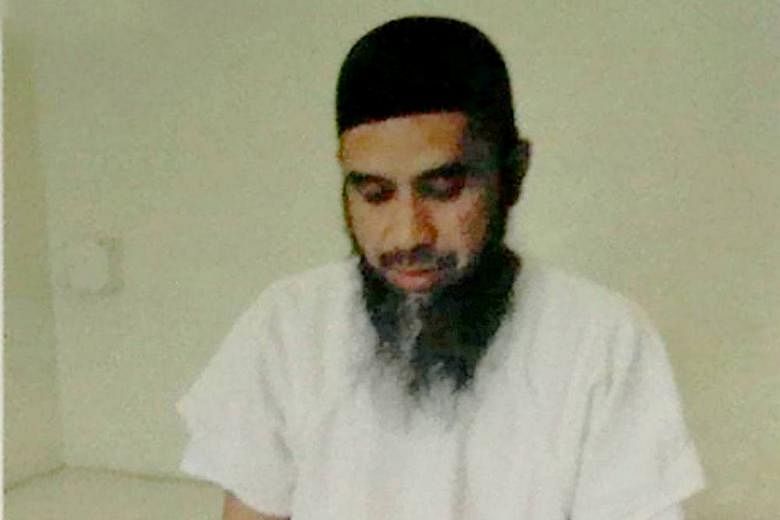The United States' decision to charge Hambali in connection with the 2002 Bali bombings, following its blacklisting of an Indonesian group linked to Al-Qaeda, signals a new security focus of the Trump administration in South-east Asia.
This comes as the US prepares for a different terrorist landscape in the region, which will be shaped by the eventual collapse of the Islamic State in Iraq and Syria (ISIS) in the Middle East, say analysts.
Hambali, whose real name is Riduan Isamuddin, is a former Al- Qaeda operative and a leader of the Jemaah Islamiah (JI). The 53-year- old Indonesian, nabbed in Bangkok in 2003 for masterminding the JI-led Bali blasts that killed 202, has been detained in Guantanamo Bay since 2006 without charge.
It was reported in June that a US war court has charged him in connection with the Bali bombings as well as the 2003 bombing of the JW Marriott hotel in Jakarta. Just days earlier on June 12, the US State Department declared the Majelis Mujahidin Indonesia (MMI) "Specially Designated Global Terrorists".
Even though the MMI had tried to rebrand itself as a peaceful organisation, in reality, it is one of Indonesia's most active Islamic groups to challenge the existing secular political order with the aim of establishing an Islamic state, according to Professor Bilveer Singh, an adjunct senior fellow at the Centre of Excellence for National Security, a research unit of the S. Rajaratnam School of International Studies.
"MMI's key activities in the last few years included accusing the Joko Widodo government of being soft on communists (and) deviant Islamic sects and of being pro-West and pro-China," he said. "The MMI has taken a leading role since September last year, in collusion with the Front Pembela Islam, another militant Salafist organisation, in trying to bring down former Jakarta governor Basuki Tjahaja Purnama, a Christian of Chinese descent also known as Ahok."
Apart from the MMI, others under the US terror watchlist include the JI and Jemaah Ansharut Daulah (JAD), as well as men such as Hambali and Muslim cleric Abu Bakar Bashir.
Bashir, now in jail for various terror offences, had set up the MMI in 2000, but resigned as its leader after he founded the JAD in 2008.
The MMI has mounted attacks in Indonesia, including claiming responsibility for a 2012 strike at a book launch in Jakarta by Muslim Canadian author and reformist Irshad Manji that left three injured.
"What must have forced Washington's hand to act against both the MMI and Hambali was the realisation that a new jihadi terrain has emerged in Indonesia," said Prof Singh. He added that the rise of ISIS in 2014 had drawn attention away from Al Qaeda-oriented groups such as the JI and MMI in Indonesia.
"The focus on IS took the security agencies' attention away from JI and MMI, helping them to reorganise and grow almost unhindered compared with the period from 2002 to 2013 when these groups were almost dismantled," he added, using the shorter name for ISIS.
"From this perspective, the US' designation of MMI as a terrorist group appears to be the Trump administration's strategic move to prepare for a post-IS terrorist landscape in Indonesia."
Indonesia remains a linchpin for Islamic militants trying to establish a caliphate in the region even as Muslim fighters battling Philippine troops in Marawi City since May are trying to do the same.
Prof Singh said the US is a strategic player in the region and its decisions on the MMI and Hambali are a clear signal that Washington intends to back South-east Asian governments in fighting terrorism post-ISIS, or when the siege in Marawi ends.
Indonesian chief security minister Wiranto, who goes by only one name, agrees. Speaking to reporters last Sunday after a regional meeting in Manado on countering the ISIS threat, he said: "All countries are on board in the fight against terrorism, including the US."
But it is unclear whether Indonesia plans to move against the MMI, although the government last month disbanded the Hizbut Tahrir Indonesia (HTI), a similar hardline group that also opposes the country's values of pluralism.
Sources told The Sunday Times that HTI members had taken part in anti-Ahok rallies as well as anti-government protests.
"What the US, or the United Nations does, Indonesia will not automatically follow," Centre for Radicalism and Deradicalisation Studies executive director Adhe Bhakti said on Friday. "In the case of the JI and JAD, both of which had publicly declared support for ISIS, the government has yet to respond, other than to say those groups were behind bombings," he noted.

